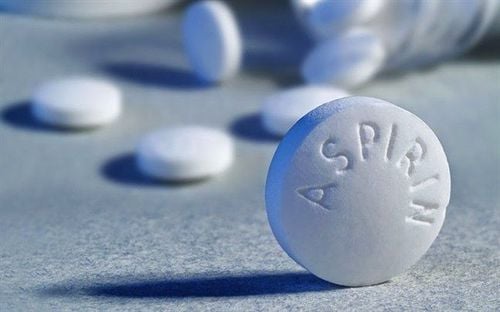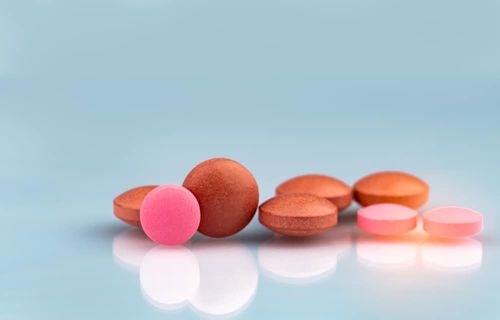This is an automatically translated article.
Avlocardyl medicine 40mg is a drug effective in the treatment of angina pectoris, myocardial infarction, arrhythmia and cardiovascular disorders. At the same time, the drug also works to maintain a stable blood pressure level.
1. What is Avlocardyl?
Avlocardyl 40mg drug has main ingredients including:
Main active ingredient Propranolol 40mg; Other excipients in sufficient quantity 1 tablet. The dosage form is in the form of tablets. This is a cardiovascular drug, which has the effect of treating angina pectoris; hypertension after myocardial infarction treatment,...
2. Effects and indications of Avlocardyl
2.1. The action of Avlocardyl Active ingredient Propranolol is a non-selective beta-adrenergic blocker that reduces cardiac output, heart rate, and the rate and extent of myocardial contraction. Propranolol inhibits renal release of renin, which blocks sympathetic nerve endings from vasomotor centers in the brain, and slightly increases blood potassium in people with hypertension, reducing systolic blood pressure.
2.2. Indications Avlocardyl 40mg Treatment and prevention of angina pectoris, except for Prinzemetal angina. Patients with hypertension, long-term treatment after myocardial infarction. Prevention and treatment of tachyarrhythmias. First aid for people with paroxysmal sinus and junctional tachycardia, atrial fibrillation or atrial flutter, and ventricular tachycardia.
3. Administration and dosage of Avlocardyl
3.1. How to take Avlocardyl Avlocardyl 40 mg is a tablet and is taken orally. You should take the medicine before eating. 3.2. Dosage of Avlocardyl For Hypertension:
Starting dose: 2 times a day, 20 - 40 mg each time, ie 1/2 - 1 tablet of Avlocardyl. Then gradually increase the therapeutic dose 3 to 7 days apart, until blood pressure stabilizes at the required level. The usual effective dose is 160-480mg taken daily. In some cases, up to 640 mg/day is indicated. The duration of treatment to achieve a hypotensive response ranges from a few days to several weeks. Maintenance dose: 120-240 mg of Avlocardyl every day. For angina pectoris: Daily use from 80 - 320 mg ie from 2 to 8 Avlocardyl 40mg tablets per day, divided into 2 or 3, 4 times a day
For arrhythmias: day 3 4 times, each time 10 - 30mg, take the drug before eating and before sleeping.
For myocardial infarction: 180-240 mg per day, divided into several times.
For prevention of recurrent infarction and sudden cardiac death, after acute myocardial infarction: 2 times a day, 80 mg each time, ie 2 tablets of Avlocardyl 40mg, if necessary, can be taken 3 times a day. Migraine disease:
Starting dose of 80 mg orally per day, ie 2 tablets of Avlocardyl 40mg divided into several times. The usual effective dose is 160-240 mg per day. The therapeutic dose can be increased gradually for maximum effect. If the therapeutic effect is not achieved after 4 to 6 weeks of reaching the maximum dose, Propranolol should be discontinued by gradually reducing the dose over several weeks. For essential tremor:
Starting dose: 2 times a day, 40 mg each time, i.e. 1 tablet of Avlocardyl 40 mg. The usual effective dose is 120mg orally 3 tablets of Avlocardyl 40mg per day, sometimes up to 240 - 320 mg / day. For subvalvular hypertrophic aortic stenosis: 3-4 times a day, 20-40 mg each time, before meals and at bedtime.
Pheochromocytoma: 3 days before surgery, 60mg per day, divided into several times, in combination with Alpha Adrenergic blockers.
Support long-term treatment with inoperable tumors: 30 mg daily, divided into several times a day.
Hyperthyroidism, Propranolol used therapeutic dose from 10-40 mg, taken 3 or 4 times a day. In some cases, intravenous injection is required; 1 mg intravenously over 1 minute, repeated 2 minutes apart, until a response is obtained or up to a maximum dose of 10 mg in conscious subjects or 5 mg in those undergoing general anesthesia.
Portal hypertension: the initial treatment dose is 2 times a day, 40 mg each time, i.e. 1 tablet of Avlocardyl 40 mg, the dose can be increased as needed, until reaching 160 mg, 2 times a day.
For children: For oral administration only, to combat hypertension.
Starting dose: 2 times a day, 0.5 mg/kg body weight each time. Usual dose: 2 times a day, 1-2 mg/kg body weight each time.
4. Adverse effects of Avlocardyl
Uncommon side effects:
Cardiovascular system: bradycardia, congestive heart failure, atrioventricular block; lower blood pressure; purpura, thrombocytopenia; Arterial hypoperfusion is usually Raynaud's. Nervous system: mild headache, dizziness, ataxia, excitability, hearing loss, visual disturbances, hallucinations, confusion, insomnia, extreme fatigue, weakness, depression leading to decreased tone. Physical brain syndrome manifests as disorientation in time and space, decreased short-term memory, and emotionality. Paresthesias in the hands, peripheral neuropathy. About the respiratory system: Pharyngitis, bronchospasm. Hypersensitivity reactions: red rash, fever with sore throat, laryngospasm, acute respiratory failure. Blood: Decreased granulocyte count, thrombocytopenic purpura, or no thrombocytopenia. Digestive system: nausea, vomiting, abdominal cramps, epigastric pain, digestive disorders such as diarrhea, constipation, flatulence. Rare side effects:
Systemic: lupus erythematosus Hair loss, dry eyes, impotence. When there are abnormal health symptoms during the use of the drug, the patient should immediately notify the treating doctor.
5. Avlocardyl drug interactions
When using Propranolol in combination with the following drugs: Amiodarone, Cimetidine, Diltiazem, Verapamil, Adrenalin, Phenylpropanolamine, Fluvoxamine, Quinidin, class 1 antiarrhythmic drugs, Clonidine, Chlorpromazine, Lidocaine, Nicardipin, Prazosin, Rifampicin, Aminophylin; dose adjustment is required.
Be careful when using drugs containing adrenaline to people who are taking beta-adrenergic blockers. This is because the drug can cause bradycardia, spasms and severe increases in blood pressure.
Closely monitor when Propranolol is used in combination with catecholamine-reducing drugs such as Reserpine because excessive sympathetic depleting may cause hypotension, bradycardia, dizziness, fainting, or orthostatic hypotension. .
Use caution when using beta-blockers with calcium channel blockers, especially with intravenous Verapamil. This is because both agents can inhibit myocardial contractility or decrease atrioventricular conduction. The combination of beta-blockers and Verapamil has caused serious health complications, especially in people with severe heart disease, congestive heart failure or new myocardial infarction.
Non-steroidal anti-inflammatory drugs may reduce the antihypertensive effect of beta-blockers. Concomitant administration of Avlocardyl 40mg and haloperidol resulted in hypotension and cardiac arrest. Aluminum hydroxide gel reduces the absorption of active ingredient Propranolol. Ethanol slows down the absorption of the active ingredient Propranolol. Phenytoin, Phenobarbital, Rifampicin increase the clearance of the active ingredient Propranolol. Clopromazine used in combination with the active ingredient Propranolol increases plasma concentrations of both drugs. Antipyrin and lidocaine decrease the clearance of the active ingredient Propranolol. Thyroxin (T4) when used with the active ingredient Propranolol causes a decrease in T3 (tri - iodothyronin) levels. Cimetidine reduces hepatic metabolism, slows elimination, and increases blood concentrations of the active ingredient Propranolol. Theophylline clearance is reduced when co-administered with Avlocardyl 40mg. Insulin, sulfonylurea hypoglycemic effects: Some symptoms of hypoglycaemia, such as palpitations and tachycardia, may be masked by beta-blockers. You need to regularly check your blood sugar, especially at the beginning of treatment. When using the drug Avlocardyl 40mg, it is best to inform your doctor about the drugs you are using so that your doctor can advise you to avoid unwanted interactions with the body.
6. Some notes when using Avlocardyl
6.1. Notes and cautions When using Avlocardyl 40mg drug for people with liver failure, kidney failure, if used for a long time, it is necessary to reduce the dose and monitor liver and kidney function regularly. It is necessary to gradually reduce the therapeutic dose before stopping the drug completely, especially in patients with myocardial ischemia. Drivers, operating machines can use Avlocardyl 40mg, pay more attention when taking the drug. You need to check the quality of the medicine and the expiry date before using it to ensure its safety. During treatment with Avlocardyl 40mg, if you have any questions, you can contact your doctor for timely answers. 6.2. Precautions for use with pregnant women and lactating mothers Consider taking Avlocardyl 40mg for pregnant women, lactating women, use only when beneficial factors outweigh, consult doctor before use.
6.3 Storing Avlocardyl 40mg medicine Avlocardyl 40mg medicine should be stored according to the manufacturer's requirements or the doctor's instructions. Store Avlocardyl 40mg in a sealed container, free of mold, and out of direct light. Appropriate room temperature, do not store the drug at temperatures above 30 degrees Celsius, suitable humidity. Store Avlocardyl 40mg medicine out of the reach of children and family pets. Avlocardyl is used in the treatment of angina pectoris, myocardial infarction, arrhythmias and cardiovascular disorders. At the same time, the drug also works to maintain a stable blood pressure level.
Follow Vinmec International General Hospital website to get more health, nutrition and beauty information to protect the health of yourself and your loved ones in your family.
Please dial HOTLINE for more information or register for an appointment HERE. Download MyVinmec app to make appointments faster and to manage your bookings easily.













